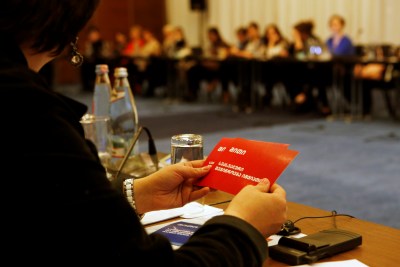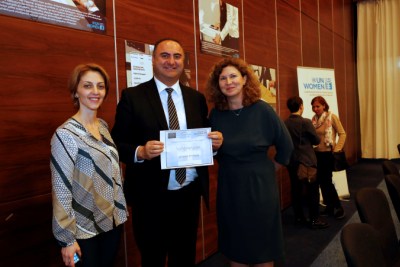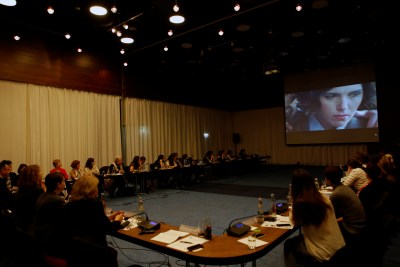High-Level Commitments to the Prevention of Sexual Harassment in the Workplace
Date:
UN Women Georgia launched an innovative e-learning course for the prevention of sexual harassment in the workplace, developed with co-funding from the European Union.

Participant of the presentation is getting acquainted with the communication material on sexual harassment; Photo: UN Women/Maka Gogaladze
One in every two women in the EU has experienced sexual harassment at least once in her lifetime, and while national data are lacking, incidental evidence points to sexual harassment being a widespread issue in Georgia, as well (European Union Agency for Fundamental Rights, “Violence Against Women: an EU-Wide Survey”, 2014). The e-learning course - developed by UN Women and launched jointly with the Civil Service Bureau of Georgia and the Public Defender’s Office (PDO) - aims to raise awareness and promote the prevention of sexual harassment in the workplace. The course was designed primarily for civil servants, but the private telecommunications company Geocell also joined the launch with the message that they will implement the course internally, hopefully inspiring other private sector actors to do the same.

The Deputy Minister of Internally Displaced Persons from the Occupied Territories, Refugees and Accommodation, Grigol Giorgadze was one of the first to take the course; Photo: UN Women/Maka Gogaladze
Guguli Maghradze, representing the Gender Equality Council of the Parliament, informed the participants of ongoing legislative initiatives to harmonize Georgian legislation with the Council of Europe Convention on Preventing and Combating Violence against Women and Domestic Violence (also known as the Istanbul Convention),which includes definition and response mechanisms related to sexual harassment. She also committed to promoting the sexual harassment e-learning course among the Members of Parliament.

A special video on sexual harassment produced by UN Women Georgia Country Office was shown at the presentation of the course; Photo: UN Women/Maka Gogaladze
The prevention of sexual harassment course was finalized within the framework of the project “Equal Access of IDPs to Economic Opportunities”, implemented by UN Women and the Food and Agriculture Organization of the United Nations (FAO) and funded by the European Union.
The course is available here: sexualharassment.ombudsman.ge